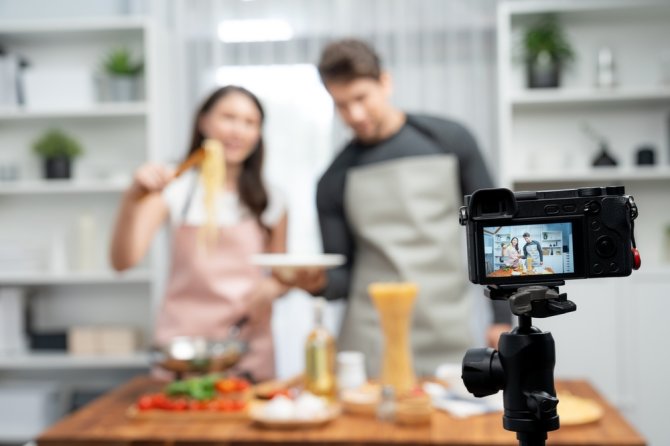
Impact story
What influence do 'greenfluencers' have on sustainable behavior?
Every day, the average Dutch young adult spends hours on social media. Sophie Boerman, associate professor of Persuasive Communication, wants to know what effect influencers on Instagram, TikTok and other platforms have on the behaviour of their generally young followers. And: how can so-called greenfluencers best frame their message to encourage their followers to make more sustainable and healthier choices?
Years of PhD research into the effects of product placement in TV programmes taught Sophie Boerman how subtly advertising can affect people. It is a form of persuasive communication, which aims to influence people's behaviour. It is still her field of research, although she now focuses on influencers; people with many followers who promote products or lifestyles on social media, whether paid or not. Greenfluencers are a niche within the social media influencer community; they focus on promoting a sustainable lifestyle. "Influencers have a lot of influence", says Boerman, "because their followers want to be like them. Because of their expertise, their credibility or simply because they are liked."
Climate concerns versus consumerism
Greenfluencers like Holland's first greenfluencer Elise Been do not yet reach the million-people audiences of influencers like Bram Krikke and Monica Geuze. But they are making good progress and their audience is growing. Boerman sees an interesting paradox: "A lot of research shows that young adults care about climate change because they have to bear the consequences. On the other hand, they're continuously exposed to content on social media that primarily promotes consumerism. I'm interested in the potential effect of greenfluencers among all those other influencers who mainly encourage their audience to buy more."

Via an online experiment, she wanted to find out what requirements greenfluencing must meet to encourage followers to adopt pro-environmental behaviour. Boerman: "We exposed young people to an Instagram account of a influencer. The aim of the experiment was to find out how important it is for an influencer to be congruent in the messages you post. We showed that influencers lose a lot of credibility if the green messages do not fit with their own accounts. This is the case, for instance, if that person also posts messages about air travel or meat recipes. We also saw that an influencer can indeed contribute to more pro-environmental behaviour, but only if the message is congruent; your account must be predominantly 'green'. For greenfluencers, this congruence is all the more important, because people are quick to label them as hypocrites."
Gain or loss frame
Unity in what you tell and show is therefore important. But according to Boerman, it is not the only factor that determines whether a sustainable message is effective: it also matters how the message is framed: "Based on the Prospect Theory, we know that losses can weigh more heavily on people than gains. Put differently, losing five euros feels worse than earning five euros."
Does this mean that influencers would be wise to emphasise in their messages what you lose by not doing something rather than what you gain by doing something? Master student Kimberley Maul investigated this. She created an account for a greenfluencer and presented respondents with messages that were packed with a gain frame or a loss frame. Boerman: "If you use the gain frame, for instance, you emphasise that by making a sustainable choice, you contribute to a better world. If you opt for the loss frame, you emphasise the negative consequences for the world if you do not make a sustainable choice."
The experiment showed that the gain-frame didn't really catch on. The loss frame did: "Not choosing the sustainable option caused feelings of shame. And they in turn ensured that people opted for that sustainable option. It may feel a bit counter-intuitive to choose something based on a negative feeling, but the loss frame turned out to work better than we expected."
Boerman sees the loss frame is used by influencers who point out the enormous negative climate impact of the clothing industry. "Influencers can be very important in setting the social norm: how normal is it to continue buying fast fashion at the expense of health and the environment? There lies a great opportunity."
She adds that a lot still needs to change. This is also evident from an analysis of more than 84,000 posts from influencers that Boerman and her fellow researchers carried out: "The analysis showed that more than 80 percent of messages are focused on consumption. Only a small part is about sustainability and consuming less."
From carnivore diet to cosmetic surgery
How do we get more influencers to share more content about sustainability, health and consuming less with their followers? Boerman does not have an immediate answer to that. She does point to a new initiative by the Dutch trade association for marketing and data (DDMA), the Dutch Association of Advertisers (bvA) and the Dutch Advertising Code Committee (Stichting Reclame Code) for the certification of influencers. By getting certified, influencers demonstrate they are familiar with European rules on transparency and greenwashing. "New regulations require influencers to be transparent about the clients they work for. They are also not allowed to participate in greenwashing, something that well-known blogger Anna Nooshin was accused of when she was portrayed on the beach in her swimsuit with a Shell bottle. "It's not like influencers get away with everything."
Yet it turns out that influencers play an important role in normalising behaviour that scientists have reservations about, because it does not exactly promote sustainability. The 'carnivore diet', which is being called for mainly by male influencers, much to the regret of science, is gaining a lot of traction on social media. Boerman also mentions the influence of influencers in the normalisation and acceptance of cosmetic procedures among young people. She is part of the Cosmetic Procedures expertise group that conducts research into the relationship between the use of social media and the choice for cosmetic procedures, such as fillers.
A survey among cosmetic consumers shows that respondents think that cosmetic procedures are common, while in reality, only 2 to 4 percent of Dutch people have undergone treatment. Is this because they are in a bubble on social media? "We know from our study that there's a relationship between the use of fillers and the amount of time people spend on visual social media. But we don't yet know whether that relationship is causal: do social media really play a decisive role in the decision to get fillers?"
She is concerned about this causal relationship: "Influencers share a lot of health information that we could call misinformation. We saw this during Covid, about the vaccinations, but a lot of misinformation is also spread about the use of sunscreen, nutrition and supplements. With fitfluencers, we see they're very good at coming up with a problem for which they then offer a solution in the form of nutritional supplements. Their health claims are often not, or only minimally, supported by science."
Experts against misinformation
How can we combat all the misinformation on social media? That is exactly what Boerman wants to find an answer to. "Once people find misinformation credible, algorithms can reinforce their opinions: ‘If you read so much about it, it must be true’. We know from literature that the most important sources to combat misinformation are experts. I think it's a good development that several doctors now have a TikTok account.
She is referring, among other things, to the doctors who launched a campaign on TikTok against influencers who advertise vaping. In response, influencer Monica Geuze removed all her messages about vaping from her social media channels. "It shows that these kinds of initiatives really help and that there are opportunities for experts to expose misinformation in other areas as well. Only with a reliable source can you counter misinformation. Influencers who are receptive to this can be of enormous help and can have a positive impact on healthy and sustainable behaviour."